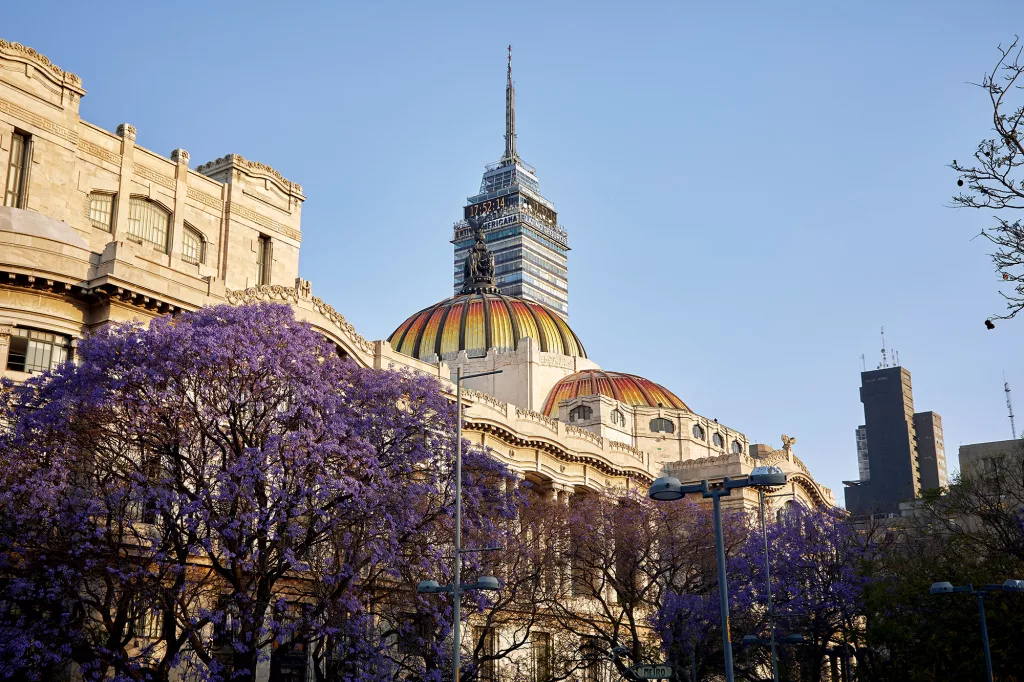Exploring Business Opportunities in Mexico: The Landscape of Potential
The country has long been recognised for its economic promise across sectors.
With its strategic geographic position, diverse economy and burgeoning middle class, Mexico makes an appealing destination for expansion and regional investment.

Mexico City: Palace of Fine Arts and the Latin American Tower
There are fundamental issues and elements driving business prospects, with an overall economic climate that has definite appeal. One of Mexico’s most significant assets is its location, connecting North and South America. This alone establishes it as a vital trade hub, particularly with the United States, its main trading partner. The US-Mexico-Canada Agreement (USMCA), implemented in 2020, has strengthened Mexico’s position with a framework to maintain stability and lower trade barriers.
The country’s vast road network, modern ports and airports allow for effective logistics and supply chain management. Free-trade agreements with 50 nations optimise Mexico’s status as a manufacturing and export base with access to global markets.
Manufacturing and Industrial Growth
Mexico’s manufacturing industry is one of the most robust in Latin America, thanks to reasonable labour prices, a competent workforce, and a long history of industrial output. The automotive industry stands out as a vital component of the national economy. Mexico is the world’s seventh-largest vehicle producer and fourth-largest exporter. Corporations including General Motors, Ford and Volkswagen own major operations in the country.
Another rapidly expanding sector is the aerospace industry. Mexico has emerged as a surprise destination, with companies such as Bombardier, Safran, and Honeywell establishing local plants. The sector benefits from Mexico’s impressive engineering skills, low costs, and growing ecosystem of suppliers and service providers.
The country’s electronics and appliance manufacturing industries are also expanding; it’s a major producer of flat-screen televisions, smartphones and home appliances, with global businesses including Samsung, LG and Panasonic firmly established.
Energy and Renewable Resources
The energy sector has promise in renewables. Mexico’s location again stands it in good stead, with solar, wind, and geothermal energy on tap. The government’s aim to lower greenhouse gas emissions and shift to cleaner energy sources has attracted major investment.
Solar, in particular, has experienced remarkable growth. Sunny Mexico’s potential is among the highest in the world, especially in the north. Reforms have prompted private investment in solar projects, and multinational businesses are setting up large-scale solar “farms”.
Literally putting wind in the sails of clean energy is the Isthmus of Tehuantepec, in the south of the country. It is one of the most promising areas for wind power generation.
The government’s high renewable energy targets, combined with growing foreign interest, indicate expansion and significant opportunities.
Technology and Innovation
Mexico’s tech sector is becoming a major Latin American player, with a thriving ecosystem of start-ups and innovation centres. Mexico City, Guadalajara, and Monterrey have emerged as tech hubs, attracting global talent and investment.
The country’s youthful population — median age 29 — represents a significant market for digital services and products. The broad use of smartphones and good internet access is fuelling demand for e-commerce, fintech, and digital services. Fintech, in particular, has seen rapid expansion; Mexico hosts more businesses than anywhere else in Latin America. These companies are capitalising on the country’s underbanked population by providing financial services that meet the demands of individuals and enterprises.
Mexico’s strong manufacturing base has fuelled growth in Industry 4.0 technologies, such as automation, AI, and the Internet of Things. Companies operating in these sectors have the potential to deliver productivity and efficiency solutions.
Consumer Market
Mexico’s growing middle class and urbanisation tendencies have created a thriving consumer base. The country’s population — more than 130 million people — includes a growing proportion of young, digitally savvy customers. The retail sector is diverse and vibrant, combining traditional markets with modern models. International merchants including Walmart, Amazon and Carrefour have set up in the country, while local chains continue to grow. E-commerce is on a roll, fuelled by reliable internet access and shifting customer behaviours. The pandemic increased online purchases worldwide, and that is true for Mexico, too.
Opportunities exist in the food and beverages sector and fashion, where rising disposable incomes and changing lifestyles drive demand. Companies that can adapt to local tastes and preferences, while exploiting digital platforms, will have a competitive edge.
Room to Roam — and Settle
Mexico has enormous potential in the real estate and infrastructure sectors. Urbanisation, population growth and rising demand for housing and commercial space drive development. Mexico City, Monterrey and Guadalajara are among the centres witnessing growth, with significant investment in residential, commercial, and industrial properties.
The government’s emphasis on infrastructure development creates opportunity for construction, engineering, and related services. Projects are varied and vast: new highways and railways mean constant demand for construction materials, equipment, and professional expertise.
Navigating Opportunities
Mexico’s broad and dynamic business landscape has potential in so many sectors, and its strategic location, competitive labour market and robust trade agreements form a solid platform for investment.
However, managing the Mexican market necessitates an awareness of the local business environment, legal structure, and cultural peculiarities. Political and economic stability, while generally favourable, can fluctuate, and incoming firms must be ready and able to adjust to sometimes fluid situations.
For corporations and investors, Mexico’s promise is evident. The key is to discover the right opportunities, form local alliances, and leverage strategic advantages to generate long-term value. As the country evolves, it retains its appeal for businesses seeking to capitalise on its vitality.
You may have an interest in also reading…
Upcoming Greek Vote a Buying Opportunity?
Mark Zandy is worried that Greece may yet prove the undoing of the euro as the country prepares for elections.
Deloitte & Touche: The Middle East’s Boost From Bank and Corporate Initiatives
The successful issuance of the Abu Dhabi Commercial Bank (ADCB) inaugural green bond in September 2022 is the latest in
Otaviano Canuto, World Bank: What’s Ailing the Brazilian Economy?
Brazil’s GDP is poised to decline by close to 7% in 2015-2016. Per capita GDP in 2016 is likely to


















































































